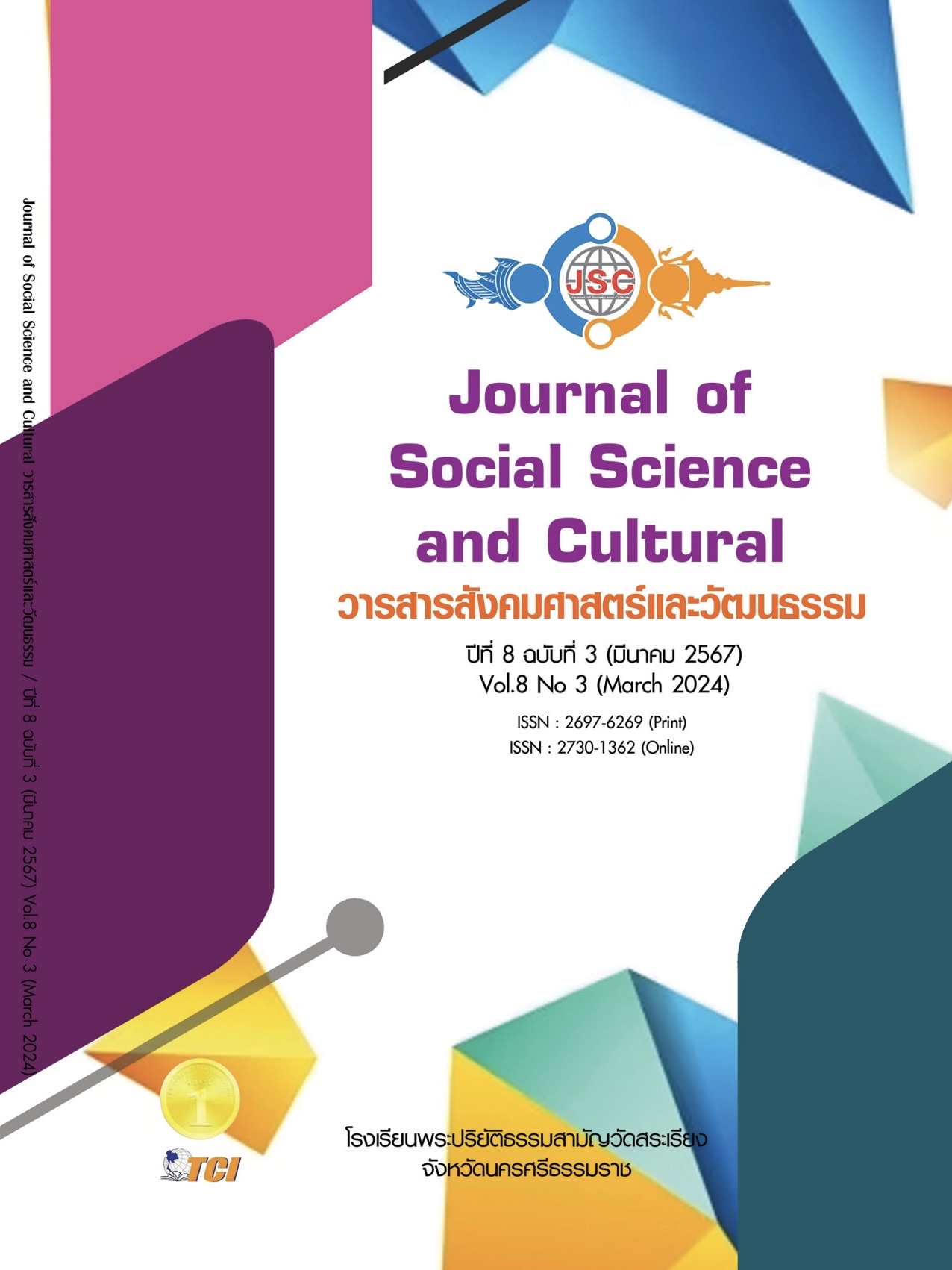SUSTAINABLE SYNERGIES: EVALUATING ENVIRONMENTAL MANAGEMENT AND ECOCOMMUNITY PRACTICES IN NORTHERN THAILAND
Main Article Content
Abstract
This research aims to study 1) environmental management characteristics and the framework of ecocommunity concepts, 2) the relevance of community activities and operations to environmental management characteristics and the goals of ecocommunity concepts, and 3) to propose ways to carry out activities that will achieve both sustainable environmental management and ecocommunity development, as well as prepare for adaptability to changes and crises. The scope of the study included the communities that have been succeeded in environmental management in the northern region. A purposive sampling was conducted. Three communities with different environmental and cultural characteristics were selected, namely: Bunrueang Community in Chiang Khong District, Chiang Rai Province; Ban Ngam Mueang Community, Khun Tan District, Chiang Rai Province and Ban Tor Phae Community, Khun Yuam District, Mae Hong Son Province. The data from relevant documents were gathered and analyzed to find the relationships between community activities, environmental management characteristics and goals of the ecocommunity concepts. The results indicated that the community activities are linked to all three environmental management characteristics and the four goals of ecocommunity concepts. It recommends activities for other similar communities aiming to achieve sustainable environmental management and ecocommunity development, such as creating management plans and utilization plans for forest resources and water bodies, establishing wildfire and smog watch centers, creating wildlife and aquatic animal conservation areas, restoring forest, forming community committees to manage forests and water, setting joint regulations, using traditions and beliefs to care for and control the use of forests and water, using forest areas to enhance life quality and economy, and practicing sufficiency economy and organic farming. These are intended to prepare communities to cope with and recover from current and future changes and crises.
Article Details
References
กรมการปกครองส่วนท้องถิ่น. (2550). มาตรฐานการจัดการสิ่งแวดล้อม. กรุงเทพมหานคร: กรมการปกครองส่วนท้องถิ่น กระทรวงมหาดไทย.
กัญญ์สิริ จันทร์เจริญ. (2548). การวิจัยทางการพยาบาล: แนวคิดหลักการและวิธีปฏิบัติ. นนทบุรี: โครงการสวัสดิการวิชาการ สถาบันพระบรมราชชนก.
เกษม จันทร์แก้ว. (2544). วิทยาศาสตร์สิ่งแวดล้อม. กรุงเทพมหานคร: มหาวิทยาลัยเกษตรศาสตร์.
เกษม จันทร์แก้ว. (2558). การจัดการสิ่งแวดล้อมในอนาคต. วารสารสมาคมนักวิจัย, 20(1), 13-19.
ไกรทอง เหง้าน้อย และคณะ. (2562). การจัดการลุ่มน้ำอิงอย่างมีส่วนร่วมและยั่งยืน. เชียงใหม่: วนิดาการพิมพ์.
ความหมายของการจัดการทรัพยากรธรรมชาติและสิ่งแวดล้อม. (2566). โครงการสารานุกรมไทยสำหรับเยาวชน โดยพระราชประสงค์ในพระบาทสมเด็จพระบรมชนกาธิเบศร มหาภูมิพลอดุลยเดชมหาราช บรมนาถบพิตร เล่มที่ 19 เรื่องที่ 1. เรียกใช้เมื่อ 24 ตุลาคม 2566 จาก https:/ /www.sara nukromthai.or.th/sub/book/book.php?book=19&chap=1&page=t19-1-infodetail02. html
โครงการคนรักษ์ป่า ป่ารักชุมชน. (2558). ป่าชุมชนบ้านต่อแพ. เรียกใช้เมื่อ 16 มกราคม 2565 จาก https://www.forest.go.th/community/โครงการคนรักษ์ป่า-ป่าร-2/
ชุมชนบ้านต่อแพ. (2565). การจัดการสิ่งแวดล้อมชุมชน. เรียกใช้เมื่อ 16 มกราคม 2565 จาก http://community.onep.go.th/location/barn_toe_pae/
นุชจรีย์ สิงคราช และคณะ. (2560). บทเรียนการจัดการทรัพยากรของชุมชนในลุ่มน้ำอิง. เชียงใหม่: Fluke Graphic Design & Printing.
มหาวิทยาลัยสุโขทัยธรรมาธิราช. (2535). เอกสารการสอนชุดวิชาการป่าไม้ชุมชน. กรุงเทพมหานคร: มหาวิทยาลัยสุโขทัยธรรมาธิราช.
รัชดา บุญแก้ว. (2561). กระบวนการพัฒนาชุมชนเชิงนิเวศแบบมีส่วนร่วม: กรณีศึกษาชุมชนบ้านโคกเมือง ตำบลบางเหรียง อำเภอควนเนียง จังหวัดสงขลา. ใน วิทยานิพนธ์ดุษฎีบัณฑิต สาขาวิชาการจัดการสิ่งแวดล้อม. มหาวิทยาลัยสงขลานครินทร์.
วถิราพร ด่านศรีบูรณ์ และภนิตา พรหมประกาย. (2560). คุณค่าพื้นที่ป่าบุญเรือง. ใน รายงานการวิจัย. มหาวิทยาลัยเกษตรศาสตร์.
วัฒนา พองโนนสูง. (2561). ชุมชนบ้านงามเมือง: การจัดการลุ่มน้ำย่อยและการปรับตัวต่อการเปลี่ยนแปลงสภาพภูมิอากาศ. กรุงเทพมหานคร: ศูนย์วนศาสตร์ชุมชนเพื่อคนกับป่า (RECOFTC).
ศูนย์วนศาสตร์ชุมชนเพื่อคนกับป่า. (2558). คุณค่าความหลากหลายทางชีวภาพและแนวทางการจัดการป่าชุ่มน้ำบุญเรือง: ป่าชุ่มน้ำผืนที่ใหญ่ที่สุดในลุ่มน้ำอิง. ใน รายงานวิจัย. ศูนย์วนศาสตร์ชุมชนเพื่อคนกับป่า.
สภาประชาชนลุ่มน้ำอิงและภาคี. (2558). รายงาน "คุณค่า ความหลากหลายทางชีวภาพและแนวทางการจัดการป่าชุ่มน้ำบุญเรือง: ป่าชุ่มน้ำผืนใหญ่ที่สุดในลุ่มน้ำอิง" สรุปจากเวทีเรียนรู้ระบบนิเวศลุ่มน้ำอิง: คุณค่า ความสำคัญของป่าบุญเรือง...ป่าชุ่มน้ำผืนใหญ่ที่สุดในลุ่มน้ำอิง. เรียกใช้เมื่อ 16 มกราคม 2565 จาก http://www.ingcouncil.org/index.php/hidemenu-sez/8-boonroung-wetland
สำนักงานสภาพัฒนาการเศรษฐกิจและสังคมแห่งชาติ. (2566). แผนแม่บทภายใต้ยุทธศาสตร์ชาติ (พ.ศ. 2566 - 2580) (ฉบับแก้ไขเพิ่มเติม). กรุงเทพมหานคร: สำนักนายกรัฐมนตรี.
สำนักนโยบายและแผนทรัพยากรธรรมชาติและสิ่งแวดล้อม. (2562a). การวางแผนและการจัดการสิ่งแวดล้อมเมืองและชุมชนอย่างยั่งยืน. กรุงเทพมหานคร: บริษัท แสงสว่างเวิลด์เพรส จำกัด.
สำนักนโยบายและแผนทรัพยากรธรรมชาติและสิ่งแวดล้อม. (2562b). แนวทางการจัดการสิ่งแวดล้อมชุมชนเพื่อส่งเสริมและรักษาคุณภาพสิ่งแวดล้อม พ.ศ. 2563-2580. กรุงเทพมหานคร: สำนักนโยบายและแผนทรัพยากรธรรมชาติและสิ่งแวดล้อม.
สำนักนโยบายและแผนทรัพยากรธรรมชาติและสิ่งแวดล้อม. (2563). การจัดทำแผนและผังต้นแบบเมืองนิเวศที่ราบและหุบเขาภาคเหนือ: ชุมชนเชิงนิเวศเมืองมาย จังหวัดลำปาง. กรุงเทพมหานคร: สำนักนโยบายและแผนทรัพยากรธรรมชาติและสิ่งแวดล้อม.
อำนวย วัฒนกรสิริ. (2557). การจัดการสิ่งแวดล้อม. วารสารวิชาการเทคโนโลยีพลังงานและสิ่งแวดล้อม, 1(1), 43-53.
Folke, C. et. al. (2010). Resilience thinking: Integrating resilience, adaptability and transformability. Ecology and Society, 15(4), 15-23.
Global Ecovillage Network. (2024). Concepts. Retrieved February 6, 2024 , from https://ecovillage.org/about/about-gen/concepts/
United Nations. (2015). Transforming Our World: The 2030 Agenda for Sustainable Development. Retrieved January 16 , 2022, from https://sdgs.un.org/2030agenda


